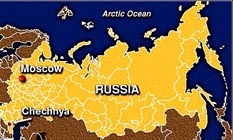The economic hurt behind Kiev's and Moscow's gas war
 Moscow - Russia has rediscovered its image as a hungry bear as it blunders too far in the latest gas spat with Ukraine, forcing Europe from its benign disregard as temperatures plunge below zero.
Moscow - Russia has rediscovered its image as a hungry bear as it blunders too far in the latest gas spat with Ukraine, forcing Europe from its benign disregard as temperatures plunge below zero.
The 2009 version of Russian export monopoly Gazprom's gas cuts is different from the 2006 standoff. Like so much else, it must be viewed through the prism of the global financial crisis and the critical blows this has dealt to the two warring parties.
The flow of Russian gas to Europe, squeezed through the alternative of smaller pipelines, was at just half its usual winter rate Wednesday and left tens of thousands in EU member states without heat.
Gazprom labeled the confrontation "unprecedented," reflecting what most observers and diplomats were wondering as they watched the blame game escalate: What pushed Moscow to such drastic measures?
No one now doubts that Gazprom's credibility will be hard to recover, and that Europe will move with new vigour to find other suppliers, coordinate energy policy and look at nuclear alternatives.
The European Union's gas needs are met only 25 per cent by Russia, but this figure masks the dependence of many Central and Eastern European while, for instance, Britain imports less than 2 per cent of its gas from Russia.
This lends itself to the theory that the Kremlin is wielding its energy bludgeon to teach a lesson to governments aspiring to the West while forgetting their former Soviet heartland - a view for which Russia's military foray into Georgia in August seemed a harbinger.
The war rather successfully undercut the merit of the Baku-Tbilisi- Ceyhan pipeline as a path for gas from the Caspian Sea, bypassing Russia.
Gazprom is undeniably an agent of the Kremlin, its largest shareholder who would probably still root for a change of leadership in Kiev.
But the national champion has fallen hard. It is faced with desperate economic concerns that the Kremlin may not want to take on, industry analysts said.
The motivation for the standoff is "very difficult to understand," said Claude Mandil, former Executive Director of the International Energy Agency, in an phone interview with Deutsche Presse-Agentur Wednesday.
"It is possible that it has a political background, but an alternative explanation is that both sides are in a very bad financial situation. Ukraine is close to bankruptcy and Gazprom will receive much less money than it expected from its sales in 2009."
The price of Gazprom's exports were linked in Europe to oil - and it was only a matter of time before they also get reduced by a third, he noted.
Gazprom earned an average of 420 dollars per 1,000 cubic metres from gas sold to Europe this year. Low estimates put 2009 prices at 250 dollars - which Ukraine balked at in negotiations before New Year.
Kiev is banking on a more radical dive in prices, analysts said this week, as it struggles to pay a gas bill at 179.5 billion dollars, having just pleaded a 1.6 billion-dollar emergency loan from the International Monetary Fund.
Gazprom, for its part, has sought a bailout from the government after its shares slumped 75 per cent amid the financial turmoil, shattering Gazprom's self-proclaimed goal of becoming the world's biggest company.
Furthermore, industry experts say there is an worrying note to what was dismissed as more muscle-flexing by Prime Minister Vladimir Putin when he said recently that the "era of cheap prices is at an end."
Huge capital investment will be needed for gas extraction, they said. This would diminish Russia's ability effectively to subsidize gas domestically - and much less so to Ukraine.
Ukraine pays about 8.5 billion dollars per year for its blue fuel, earning back 3 billion dollars in the same period from transit tariffs, according to the Oxford Institute for Energy Studies.
Gazprom chief executive Alexei Miller said Kiev's debt would soon amount to billions of dollars if the deadlock persists.
Gazprom may well be cash-strapped, but in the long term, it seems to have earned itself years of damage control.
The only obvious upside for Russia: It may gain support for pipeline projects bypassing Ukraine, such as the Nord Stream pipeline to run direct to Germany.
"Whatever the causes or responsibilities, (the crisis) is a tragedy for Gazprom," Mandil said. "What is at stake is the reliability of Gazprom itself." (dpa)